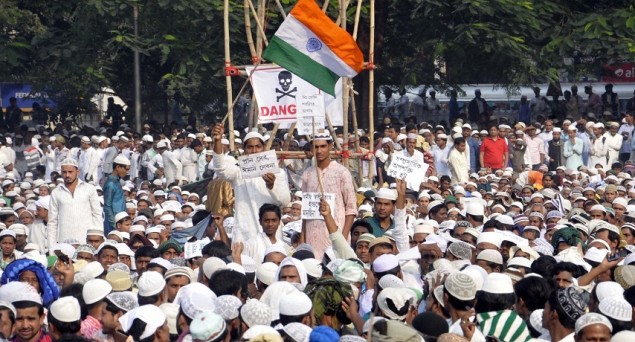Shafeeq Rahman,
The Uttar Pradesh assembly election 2017 is being widely seen as semi-final of General Elections 2019 and as a gateway to reach the throne of Delhi. Instead of policies and performances of political parties, voting behaviour in India’s most populated state is mainly influenced by religious and castes affiliations. BJP would try to polarize the voters on communal lines as happened in the parliamentary elections 2014 while the SP, BSP and RLD will try to bag the maximum vote of their castes i.e. Yadav, Scheduled Castes and Jats respectively. Muslims are by default considered as the vote bank of all non-BJP parties and as a tool for each of them to blame for their defeat while the community is never given credit for victories.
Muslims who constitute 19.26% of total population of Uttar Pradesh are the pivot in such a communal and caste divided atmosphere. Around 152 Assembly Constituencies have sizeable Muslim population of more than 20% which could be the decisive segment in assembly election and can widely impact overall forming of state government. Just 3-4% swing of votes can drastically change the results in Uttar Pradesh since the winner parties in last three assembly elections have not crossed the 30% vote share mark. With the lead of only 3.2% vote share of SP over BSP in 2012 assembly election, winning seat difference was 144. Muslims perhaps first time were close to their proportional representation in the last assembly with 66 Muslim MLAs in the 403-member Assembly, but their real representation in terms of raising the community related issues beyond the party lines largely remained negligible.
Uttar Pradesh would be a four-cornered battleground among SP, BSP, BJP and INC if all parties go without any pre-poll alliances. A possible alliance could be between INC, SP and RLD to consolidate their voters, mainly Muslims and for presenting a united face against the BJP and BSP. This Assembly election would be a real test for BJP which seems confident by gaining 42.32% votes in the last parliamentary election and wants to show its victory in the state as a mandate on its highly-criticized demonetization policy. The ruling SP is still struggling from the family rift over leadership of the party that has caused loss of its all credibility achieved in last five years through all round development of the state. BSP is talking about the chemistry of scheduled castes and Muslim voters who cumulatively constitute 40% of the state population. BSP could be a natural choice of Muslims in this election. BSP previously failed to deliver a roadmap for Muslim development, except taking the credit of riot free government. Indeed, communal incidence during BSP was reduced manifold in comparison to SP government. INC is already contesting a lost war by projecting Sheila Dikshit as its chief ministerial candidate. AIMIM is also considering to contest UP election and it is the only party among the other Muslim political parties whose leadership has raised the community related issues at national stage for years. But like other Muslim political parties, it also failed in creating the network of dedicated workers at ground level.
Polarisation has definitively played an important role in previous parliamentary election (2014) in Uttar Pradesh in favour of BJP which has around the double share of seats in comparison to its overall vote share. BJP vote share was 42.32% but it won 329 assembly segments, almost 81% of total seats. (The party had won 72 of 80 Lok Sabha seats). While BSP was adversely affected with such polarization, it won only 2% seats (9 out of 403 ACs) though it secured 20% vote share. Due to such polarization, BJP gained at the cost of split in other political parties. Similar was the scene in the 2012 assembly election.
According to the latest ABP-CSDS pre-poll survey, the SP will bag about 54 percent of Muslim votes. Around 14 percent Muslim votes will go to the BSP, while the BJP and Congress lag behind with 9 percent and 7 percent respectively. SP votes would further split in case of division in it and without an alliance with INC and RLD. However, tactical voting by Muslims can keep the communal forces out of the state.
Muslims are largely considered a tool of vote polarization in and against of any political party for tactical voting but the issues of their legitimate representation and development are generally ignored during and after the election. The Supreme Court has given the order to keep the caste and religion out of electioneering process, but it can be misused during the implementation. Political parties should equally treat each elector with development agenda and avoid such tactics for unwanted polarization that creates more gaps among communities in the state.
— Shafeeq Rahman is a Delhi-based researcher. He can be contacted at [email protected] .





